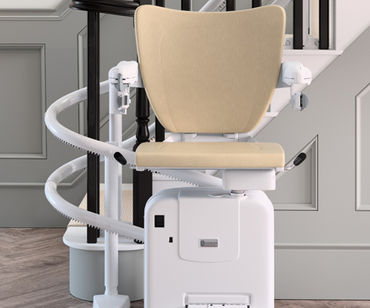
Take advantage of summer this year
Summer is just around the corner and as the temperatures get warmer, elders should start to think about going outside and breathing in the fresh air.
For the elderly, even if they are experiencing mobility problems and need stairlifts for the home, getting outdoors can be hugely beneficial.
From boosting overall health to sleeping better, the benefits of going outdoors are endless for the older generation.
A doctor at DocTap GP agrees and says it is vital for the elderly to keep active and go outdoors, “As a GP I am well aware of the physical and psychological challenges faced by our patients, our role is limited to diagnosing and managing conditions which aim to improve quality of life.
“Keeping active and going outdoors is essential to keeping the mind and body optimal and crucial to ensuring better health outcomes.
“The health benefits of Mobility and Independence in the elderly population are numerous and the positive effect it has on the patient is often priceless.
“As doctors our principle aim is to promote and maintain good health, and keeping patients moving and independent is of paramount importance.”
This is backed up by the Benefit from Activity website, who say, “Physical inactivity is the fourth biggest killer in the world. As little as 15 minutes of regular daily exercise is enough to make you live longer and have a better quality of life.”
So, with this in mind we guide you through some of the benefits and some great activities you could try over the summer period.
The benefits of getting outdoors
Another GP from DocTap explains what some of the benefits of going outdoors are, “Being outdoors is especially important as we get older for a variety of reasons including getting our daily dose of Vitamin D, keeping physically active and maintaining social activities and relationships. Evidence also shows this helps improve our mood, sleep, energy levels and immune function.”
Here we explore some of the benefits.
Improves your health
Summer should hopefully bring lots of sunshine and this in turn can help generate Vitamin D, which is good for the brain, bones and muscles. In fact Vitamin D and going on short walks can help ward off osteoporosis, heart disease and some types of cancers as well as improve circulation.
Another common belief is that being outdoors provides a person with greater feelings of vitality and in turn makes that person more resistant to colds and illnesses.
Increases energy
Spending time outside and connecting with nature can help people feel more alive, according to research from the University of Rochester in the US. It is therefore unsurprising that going outdoors has been linked to improving energy.
Richard Ryan, professor of psychology, psychiatry, and education, said, “Research has shown that people with a greater sense of vitality don't just have more energy for things they want to do, they are also more resilient to physical illnesses. One of the pathways to health may be to spend more time in natural settings.”
Lifts spirits
Heading outdoors also means the elderly can socialise and interact with friends, family and other adults and children. This can give someone an extra spring in their step and can rejuvenate them.
A study by the University of Michigan discovered walks in nature can significantly reduce levels of depression and stress and improve better mental health and well-being.
Feeling the sunshine on your face and breathing in the fresh air simply makes everybody feel happier and better within themselves.
Ingrid J Collins, consultant practitioner psychologist and registered spiritual healer for Soul Therapy, goes into more detail about how getting outdoors can reduce stress and depression.
She says, “The great outdoors offers any amount of attraction for the elderly. Many people in later life find themselves living alone, having had their children leave the family nest and suffered the loss of a loved partner.
“Loneliness is demonstrated to be a significant factor for creating stress, depression and consequent ill health.
“Outdoor activities bring people into contact with groups of people who share a common interest in fitness by participating in a sport, sharing the group enthusiasm for a local team, or simply by meeting others walking in a park or sitting at a pavement café.
“Connection with others, either singly or in a group, brings enjoyment or counteracts thoughts of depression and stress. Connecting with the natural environment is in itself beneficial as fresh air and hopefully the summer scenes bring an appreciation of life and of the beauty of nature.
“Colour therapists will add that being in a predominantly green environment serves to bring a person back to their centre of stability.”
Enhances relationships
Getting outdoors is a great way to socialise and interact with other people and spending time with family or friends by heading outside can really strengthen the relationship.
Meeting up friends in the local park, for example, is a great way to get outdoors and talk about events from the past week.
Playing games like bowls with friends will also make the elderly feel part of a team and a community and is something that they can look forward to during the summer months.
Increases memory and attention span
Research has also shown that spending time outdoors can help strengthen the ability to concentrate.
One study found that one child with Attention Deficit Hyperactivity Disorder (ADHD) who played outdoors exhibited fewer symptoms of the disorder than another child who was playing indoors.
This shows how being outside can improve someone’s attention span and it is also well-known that walking outside can increase the level of productivity as well as creativity.
Improves sleep
By heading outdoors you’re more likely to be exercising and this has found to help people sleep better.
This means that after a good night’s sleep, the elderly can feel more bright-eyed and bushy-tailed the next day.
Outdoor activities for the elderly to try
Instead of elderly people with mobility problems getting overwhelmed by the potential challenges, it is important to focus on activities and interests that they can enjoy. Here are some recommendations.
Going for a walk
As we have mentioned, walking has numerous benefits for the elderly and by beginning slowly this can be built up over time.
Start with three or four minute walks in one direction before turning around and coming back home. Then after a while this can be slowly increased.
In the UK there are lots of beautiful walks right on your doorstep and some of the best are managed by National Trails. In total they manage 16 trails that boast their own unique landscapes, which is why they attract 83 million visitors each year.
Talking about the benefits of walking, a spokesperson for National Trails, says, “Walking is the best way to stay active, it’s great for your mental health as well as keeping your body in good shape.
“National Trails are the very best walks in England and Wales. They are long distance routes, but you don't have to walk them all at once, they are lots of short walks to stunning places along the Trails.”
One walk trail that is managed by National Trails is Cotswold Way, a 100-mile trail with long distance views from the Cotswold escarpment. While someone with mobility difficulties won’t be able to walk for long distances there are parts of the trail they can attempt as it goes from Bath up to Chipping Campden.
The 205 miles of the Pennine Bridleway is home to ancient packhorse routes and boasts two large loops that offer great walks.
Watch a sporting event
Whether it’s watching a grandchild’s football game or a professional match, which are not all-day events can be really beneficial.
There are so many sports played all over the UK and just going to watch the local team can help the elderly interact with other people and improve self-esteem.
Actually getting out and watching sport is so much better than watching it on TV as you can get a close-up look at the athletes in action and can really get involved in the atmosphere.
Go bird-watching
If you love wildlife, then one great past time to get involved in is bird-watching.
The elderly don’t even have to leave home as anyone with a birdhouse, bird feeder or bird bath in the garden can go outside and wait for birds to swoop down for a wash or a snack.
There are also plenty of places in the UK that are perfect for bird-watching and the Bird Watching magazine recommends destinations such as the Norfolk Broads and Northumberland for its abundance of birds.
Go swimming
As water is 12 times denser than air, swimming is an effective way of toning muscle.
Working out in water provides a certain amount of water resistance and this has a similar effect as using a light weight on a resistance machine at the gym, which can really help someone with mobility problems. Swimming is low impact, meaning it is easier on your body and your joints, but is still a great way to get your heart pumping.
Swimming also has a positive impact on breathing and has even been known to improve the symptoms of asthma sufferers. Swimming helps increase lung volume and helps people learn better breathing techniques that will help in other walks of life.
Swimming works a lot of the body’s muscles at the same time and is also really helpful as a way to stretch out your whole body. This improves flexibility and can be a really useful exercise for those with mobility difficulties.
Go fishing
Even if someone has mobility problems or uses a wheelchair, they can still enjoy fishing.
Casting a rod from a pier or beside a river, canal or lake is easy and the fresh air can be invigorating.
Fishing also gets people to enjoy the grandeur of nature and this can have a calming/inspiring effect on a person and is the ultimate outdoor activity for relaxation. Fishing really does relax the mind, body and soul and being beside the water makes one feel free of the hectic world.
Have a picnic with the family
The summer gives people the opportunity to go out for more picnics and having a lovely lunch in the park with the family is a great idea.
The elderly can watch children running around and playing and will love the social element of being around their family.
Go on more day trips and holidays
Elderly people that live in cities should become a tourist for the day and take an open-air bus to see the local attractions.
Boat tours are another great trip to go on, although people with mobility problems will need to check with the provider that their boat is easily accessible.
There are plenty bus trips and specialised holidays for seniors available from sites like Grand UK Holidays. This specialist provider caters for over 55’s and offers coach, cruise and rail holidays as well as holidays by air.
Their holidays in the UK include visiting the likes of Bournemouth, Yorkshire Dales, Cheshire, Cornwall, Dorset, the Cotswold’s and Sussex to name a few.
By going on a day trip or a holiday it gives the elderly a great opportunity to meet new people and see new places.



